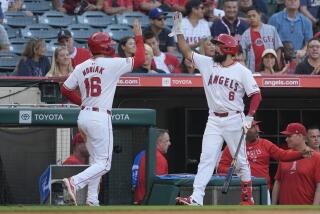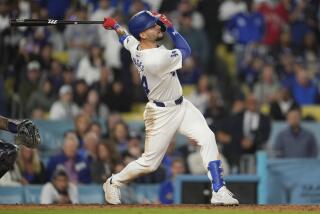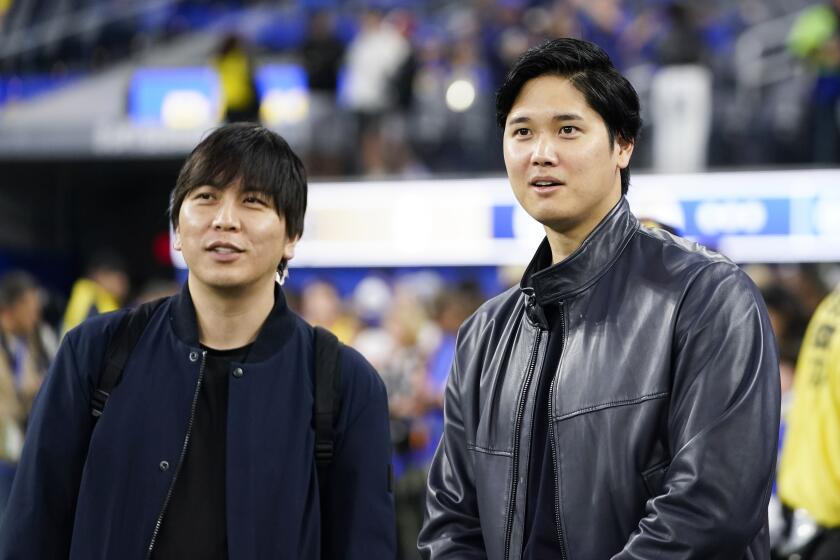They Looked for Union Label on This Trade
Now that the Mo Vaughn trade is finally done--peace treaties have taken less time--it feels like the first day after the rainstorm, when the air is crisper and those mountains in the distance reappear.
Vaughn’s time with the Angels represented the darkest hour yet, the most indisputable evidence that the franchise was cursed. Now that he’s gone, the sky looks a little bluer.
The Angels were able to get Kevin Appier, a quality starting pitcher, from the New York Mets. That’s a pretty good deal for a player who just missed an entire season because of an injury and still has a huge contract, and has publicly expressed a desire to be elsewhere. I thought the Angels would have to resort to a trade like that soccer deal in Europe, where a team exchanged a player for some sacks of cement.
Add free-agent signee Aaron Sele and Angel General Manager Bill Stoneman has solidified the starting rotation this week.
The Angels are ecstatic that they found someone to take Vaughn off their hands. The Mets, for some reason, were trying to get this done even though there’s no way to hide Vaughn’s defensive deficiencies in the National League. Vaughn is so eager to get back to the East Coast that he’s willing to defer money to do it.
But the players’ association didn’t like Vaughn’s accepting deferred payments on his signing bonus, saying that lowered the real value of the contract. The union thinks it sets a bad precedent and haggled about the payments’ interest rates. Is this a baseball trade or a mortgage?
This reminds me of a book by Richard Dawkins called “The Selfish Gene.” It argued that the driving force in life is the DNA molecules, and that everything else--from humans to goldfish--exists merely to help the genes survive. That pretty much matches the view of the union, which thinks that major league baseball, the stadiums, the television contracts all exist solely to further its own ends.
As a result, a deal that should have been finished Tuesday dragged on and on. If the union can throw a roadblock into these proceedings--when all the other parties are ready to sign off--how do you like the chances of getting a new collective bargaining agreement in place by the start of spring training?
If there is spring training, the Angels can go with a little optimism. It always starts with pitching, and the Angels got better while Seattle lost Sele. Maybe that will help give them a 10-game dent into that 41-game cushion the Mariners enjoyed over the Angels in the American League West last year. It’s a start.
Meanwhile, it’s an official end to the Vaughn era.
Vaughn’s signing for $80 million was supposed to be a watershed moment for the franchise. Disney finally kicked in the cash for a top-notch free agent. It was supposed to be a sign to the team and the fans that this organization was serious about winning.
The Angels had finished only three games out of first place the year before. Now it had Vaughn’s big left-handed bat. He was also supposed to bring clubhouse leadership, give the Angels a little more attitude.
In his very first game, he injured his ankle while chasing a foul ball into the dugout and it bothered him the rest of the season.
But something about Vaughn’s stay in Anaheim seemed wrong even before that. From the moment he first tried on that uniform, with the periwinkle blue and the cartoonish Angel logo, he didn’t look quite right. He never felt comfortable enough with his surroundings to take control of the Angels’ clubhouse and wound up keeping to himself.
Without a strong presence, the clubhouse became such a pit of sniping and backbiting that the underachieving Angels cost Manager Terry Collins and General Manager Bill Bavasi their jobs.
The fallout from the Vaughn disappointment stretched from Anaheim to Burbank. The Disney higher-ups seemed so shaken up by their big free-agent bust, they stopped shopping.
But the good news is, it pushed them in the direction of selling the team. They realized they aren’t good at this sports thing and they have all but hung a “For Sale” sign on the Angels and Mighty Ducks. Problem is, the Florida Marlins and Boston Red Sox and even the Montreal Expos have been more appealing targets. Still no takers for the Angels.
If the Vaughn mistake was the final straw for Disney, then these last three years will have been worth it. When Vaughn played, his numbers weren’t that bad. He hit 69 home runs and drove in 225 runs in two seasons. But his .272 batting average in 2000 was his lowest since his rookie year, and he struck out a league-leading 181 times.
Then he sat out the entire 2001 season after having surgery for a torn biceps tendon.
He spent his newfound free time eating, waxing nostalgic for his old days in Boston, and eating some more. He said he wanted to be back on the East Coast and missed the intense baseball fans.
Why did he leave in the first place? You didn’t have to major in geography to know that California was 3,000 miles away. Vaughn played in the American League, so he’d seen the tepid crowds in Anaheim.
He chased the money, of course, followed it all the way across the country.
Now he has come around, to the point that he was willing to restructure his contract and take less money up front.
It was best for Vaughn and the Angels. Everyone could see that--except the players’ association. You get the sense the union would take the pastor up on his offer for any objectors to speak now or forever hold their peace at a wedding and insist the bride get a no-trade clause.
Thursday’s transaction was more like an annulment. And never has one felt so good.
*
J.A Adande can be reached at [email protected].
More to Read
Go beyond the scoreboard
Get the latest on L.A.'s teams in the daily Sports Report newsletter.
You may occasionally receive promotional content from the Los Angeles Times.






